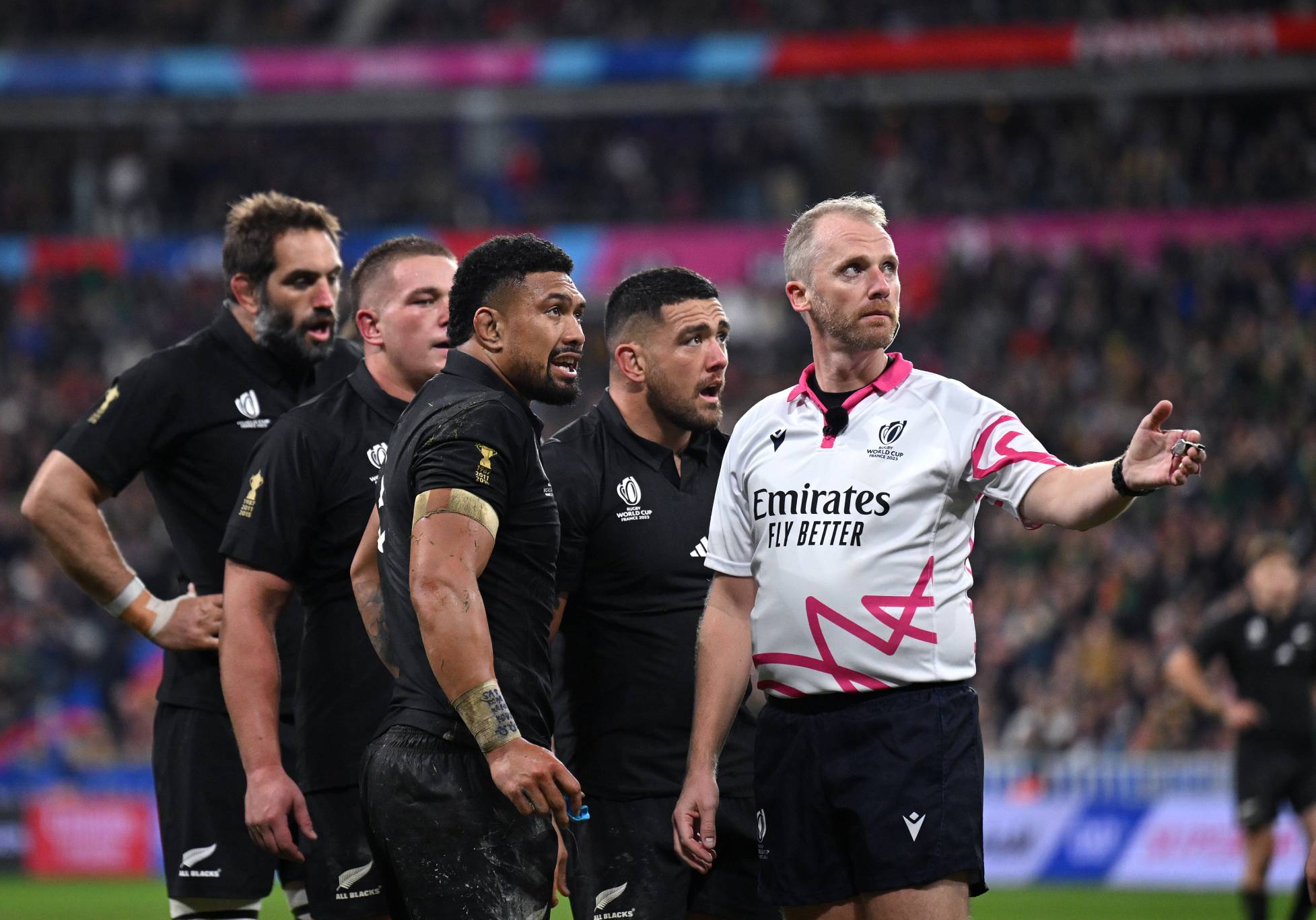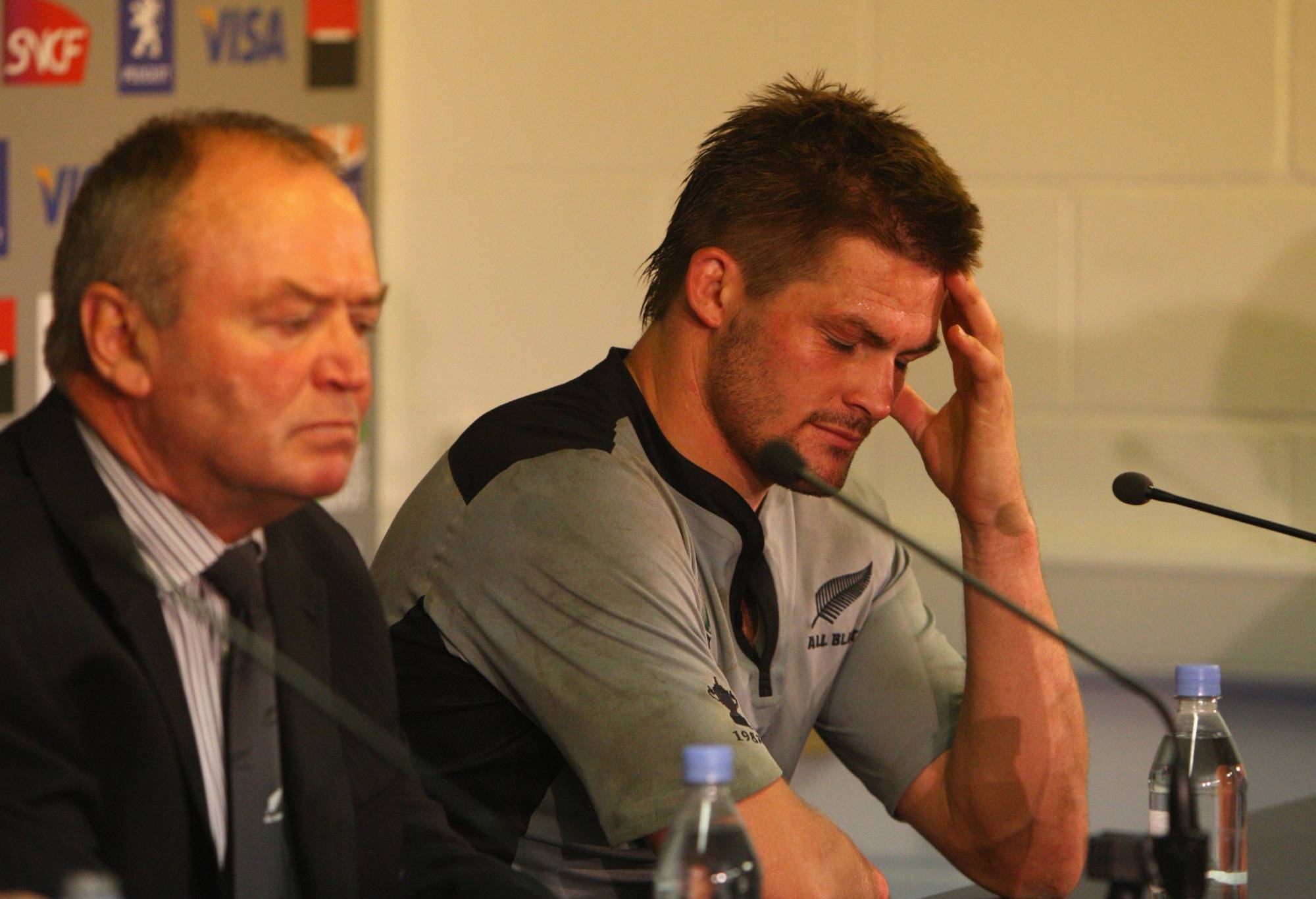Plenty of New Zealand fans are struggling to accept the one-point loss to South Africa in the World Cup final and a Kiwi media organisation has put fuel on the fire for the ‘we wuz robbed’ brigade.
Stuff has reported that World Rugby had told the All Blacks that Aaron Smith’s disallowed try in the final should have stood – because Sam Whitelock’s line out knock on happened four phases before the scrum half crossed.
Under the rules, the TMO, Tom Foley, was only allowed to go back to check two phases before the try was awarded.
“Stuff understands World Rugby has privately acknowledged to the All Blacks that the ruling out of Aaron Smith’s try in the final was in fact outside the rules, but is refusing to publicly acknowledge that,” the organisation wrote.
“Discussions have been ongoing in an effort to get World Rugby to publicly clarify that the TMO ruling was a breach of the current rules governing the game.”
The All Blacks did cross for the only try of the game minutes later but Richie Mo’unga missed the kick from out wide in a 12-11 loss.
On Thursday, Stuff included the incident on a list of ‘New Zealand’s worst sporting robberies’.
World Rugby, meanwhile, released a statement in response with a veiled warning to the media organisation for setting up Foley as a potential target of hate.
“As confirmed prior to Rugby World Cup 2023, World Rugby does not publicly comment on match official decisions.

Ardie Savea of New Zealand and teammates talk to Referee Wayne Barnes during the Rugby World Cup Final match between New Zealand and South Africa at Stade de France on October 28, 2023 in Paris, France. (Photo by Hannah Peters/Getty Images)
“We stand by our outstanding match official team, who performing one of the hardest jobs in professional sport to an exceptional standard.
“As we have seen in recent months, sadly, criticism of match officials can have wide-ranging consequences, including online hate and threats, and we must be mindful of such a human impact.”
World Cup final referee Wayne Barnes, who has since retired, has been open about death threats he has received in his career in his newly released autobiography ‘Throwing the Book‘.
Barnes particularly took aim at former All Blacks coach Graham Henry, who had speculated in own 2012 autobiography that the official may have engaged in match-fixing during their controversial and dramatic 20-18 World Cup quarter-final loss five years earlier in France.
Henry’s comments came after Barnes missed a forward pass during the quarter-final that proved telling in the All Blacks’ shock loss.
Now, more than a decade later, Barnes has hit back.
“Someone that senior and with that much influence saying something like that is pretty s* and could have had huge ramifications for me and the game of rugby,” he wrote in ‘Throwing the Book’.
“I can forgive someone saying something horrible in the heat of the moment, but he’d had five years to think about it, and an editor must have said to him at some point, ‘Do you really want to write that?’.”
Barnes, a barrister by trade, said he had several defamation lawyers contact him if he wanted to sue Henry. Barnes, ultimately, chose not to however hasn’t forgotten the former coach’s comments.
“I’ve never shaken Henry’s hand since, though, and I doubt I ever will,” Barnes wrote.

Wayne Barnes has hit back at comments from former All Blacks coach Graham Henry and captain Richie McCaw questioning his ethics. (Photo by Stu Forster/Getty Images)
Barnes, who was the least experienced referee at the 2007 World Cup, said he was surprised and disappointed that former All Blacks captain Richie McCaw, who led the nation to three World Cups, took aim at him during his own autobiography.
“McCaw said I’d been ‘frozen with fear’ and ‘wouldn’t make any big calls’ because I was so inexperienced,” Barnes wrote. “Besides the forward pass, I’m not sure what ‘big calls’ he thought I should have made.”
All Blacks to face Les Blues
Scott Robertson’s All Blacks will face France in November next year while the Wallabies will play the World Cup hosts in 2025, according to French media reports.
Although NZ Rugby hasn’t confirmed details of the All Blacks’ season-ending tour for 2024, French rugby newspaper Midi Olympique says they will take on Les Bleus on November 16.
The sides met at the recent World Cup, with France winning the opening game of the tournament 27-13.
France will also play against Japan and Argentina in November 2024. In 2025 France will host South Africa, Fiji and Australia during the November Test window.
Toxic culture revealed
A damning independent review of the Welsh Rugby Union published on Wednesday reveals a “toxic” culture of bullying and discrimination and said the organisation was an “unforgiving and even vindictive” place to work.
The review was established in February 2023 after a BBC programme reported allegations from former employees of sexism, discrimination and misogyny and led to the resignation of chief executive Steve Phillips.
His successor Abi Tierney, who takes up the role in January 2024, said the review’s report was “incredibly humbling and describes issues, actions and attitudes that are hugely regrettable. They should not exist in our, nor any, workplace.
“Of course, as leaders of the organisation, we all wholeheartedly condemn the attitudes and issues described but we are equally aware that our response needs to be greater than this,” she added.
“The fact that we have a report like this from an independent source identifying any issues and problems that exist in our culture is a great opportunity for us to transform the way we work.
“We can feel inspired that everything is out in the open. We can feel empowered that our people know they will be listened to and that we will act proportionately and appropriately to behaviour that is called out in the future. We will implement all of the recommendations of the panel.”
The review made more than 30 recommendations, that include the appointment of an oversight body and a better system for handling complaints.
Among its findings it said the WRU lacked the appropriate skills to run a 100 million pounds ($NZ208 million) business and that it tried to “manage away” complaints rather than dealing with the underlying issues.
It described the WRU’s Board as “dysfunctional, ill-equipped and unable to address the serious institutional and cultural problems it faced”.
The review said its three independent members had been struck by “how many people had experienced great stress from the connection with the WRU” and that “an unusual number worried about the consequences of their identity being revealed” due to the WRU being “unforgiving, even vindictive.”
WRU chairman Richard Collier-Keywood responded to the report by saying: “On behalf of the whole WRU, we are truly sorry to those who have been impacted by the systems, structures and conduct described in the report which are simply not acceptable. We have to do better, and we will.
“This report covers our governance, our culture, our approach to women’s and girls’ rugby and behaviours of leadership. For anyone who cares about rugby in Wales it is a very difficult read and it is a particularly difficult read if you work at the WRU. It is clear that there were many opportunities to avert the serious problems described which were simply not taken.
“We have a lot of work to do to win back the trust of our colleagues our players, the volunteers who are the heart of our community game, and the supporters that buy tickets week in week out.”
(With agencies)






























































































